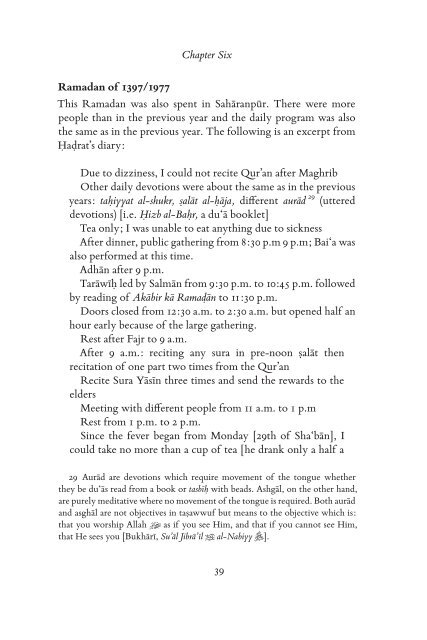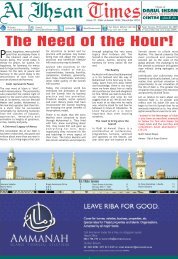TheRamadan of Shaykh Al-Hadith Ml ZakariyyaKandelwi by Dr Muhammad Ismail Memon Madani
TheRamadan of Shaykh Al-Hadith Ml ZakariyyaKandelwi by Dr Muhammad Ismail Memon Madani
TheRamadan of Shaykh Al-Hadith Ml ZakariyyaKandelwi by Dr Muhammad Ismail Memon Madani
You also want an ePaper? Increase the reach of your titles
YUMPU automatically turns print PDFs into web optimized ePapers that Google loves.
Chapter Six<br />
Ramadan <strong>of</strong> 1397/1977<br />
This Ramadan was also spent in Sahāranpūr. There were more<br />
people than in the previous year and the daily program was also<br />
the same as in the previous year. The following is an excerpt from<br />
Ĥađrat’s diary:<br />
Due to dizziness, I could not recite Qur’an after Maghrib<br />
Other daily devotions were about the same as in the previous<br />
years: taĥiyyat al-shukr, śalāt al-ĥāja, different aurād 29 (uttered<br />
devotions) [i.e. Ĥizb al-Baĥr, a du‘ā booklet]<br />
Tea only; I was unable to eat anything due to sickness<br />
After dinner, public gathering from 8:30 p.m 9 p.m; Bai‘a was<br />
also performed at this time.<br />
Adhān after 9 p.m.<br />
Tarāwīĥ led <strong>by</strong> Salmān from 9:30 p.m. to 10:45 p.m. followed<br />
<strong>by</strong> reading <strong>of</strong> Akābir kā Ramađān to 11:30 p.m.<br />
Doors closed from 12:30 a.m. to 2:30 a.m. but opened half an<br />
hour early because <strong>of</strong> the large gathering.<br />
Rest after Fajr to 9 a.m.<br />
After 9 a.m.: reciting any sura in pre-noon śalāt then<br />
recitation <strong>of</strong> one part two times from the Qur’an<br />
Recite Sura Yāsīn three times and send the rewards to the<br />
elders<br />
Meeting with different people from 11 a.m. to 1 p.m<br />
Rest from 1 p.m. to 2 p.m.<br />
Since the fever began from Monday [29th <strong>of</strong> Sha‘bān], I<br />
could take no more than a cup <strong>of</strong> tea [he drank only a half a<br />
29 Aurād are devotions which require movement <strong>of</strong> the tongue whether<br />
they be du‘ās read from a book or tasbīĥ with beads. Ashgāl, on the other hand,<br />
are purely meditative where no movement <strong>of</strong> the tongue is required. Both aurād<br />
and asghāl are not objectives in taśawwuf but means to the objective which is:<br />
that you worship <strong>Al</strong>lah u as if you see Him, and that if you cannot see Him,<br />
that He sees you [Bukhārī, Su’āl Jibrā’īl e al-Nabiyy s].<br />
39



